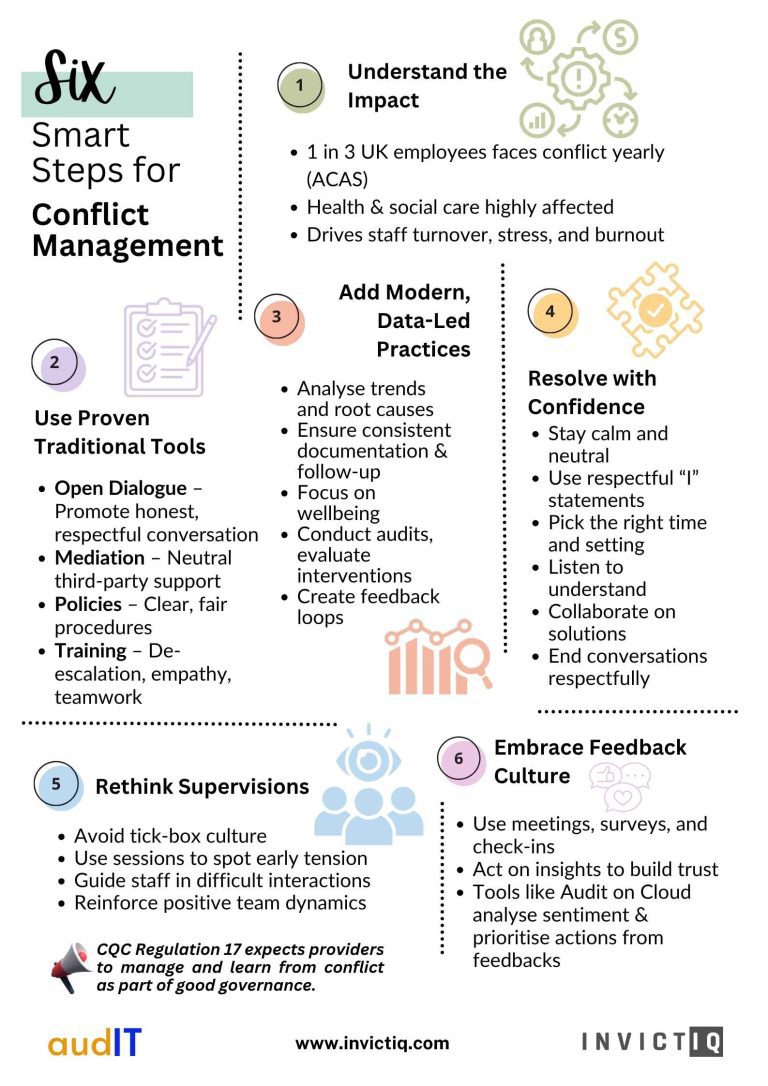@2021 invictIQ is a venture by Sprint Consultancy. All rights reserved. Privacy Policy.

Conflict Management in Care Provisions
by Mark Topps
In any organisation, conflict is not a question of if, but when. Whether it’s a clash of personalities, misaligned goals, poor communication or pressure from demands, conflict is a natural byproduct of people working together. For managers, the challenge isn’t to eliminate conflict but to manage it constructively.
I was contacted by someone who has read some of my previous blogs, but wanted an infographic around conflict management, alongside something to help them and so I thought I would utilise this blog to write about some of my tips and experiences in the hope it can help others.
Who Cares for You?
Management can be a lonely role, you are often managing staff, dealing with their disputes, emotions and often managers, especially in health and social care, do not have leaders above them taking time for them. Conflict management is another aspect of management that takes your energy and it is important that if you feel you do not have support from above, that you are utilising free resources to support yourself. The Hub of Hope is the UK’s largest mental health support directory. You can find out more here: www.hubofhope.co.uk
Impact of Conflict in the Sector
I thought it would be handy to explore some of the stats around conflict in social care to help understand the importance of why as managers we need to manage it effectively.
- According to ACAS research, over one-third of UK employees experience workplace conflict each year, with health and social care among the sectors most affected.
- Conflict has been cited in the past as one of the leading causes of staff turnover, contributing to the sector’s high attrition rate.
- Conflict related stress and burnout are significant contributors to mental health concerns.
Traditional vs Modern Conflict Management Approaches
Historically, managers and providers have relied on traditional strategies which work and include:
- Open Communication – encouraging honest, respectful dialogue to prevent misunderstandings from escalating into full disputes.
- Mediation via a third-party to help resolve interpersonal conflicts, especially when emotions are running high or communication has broken down.
- Clear Policies and Procedures so that there are clear, well-defined protocols for handling grievances and complaints, ensuring consistency and fairness in conflict resolution.
- Training and upskilling staff with skills in de-escalation, empathy and teamwork to help them navigate working effectively together and managing difficult interactions more effectively.
While these methods remain essential, we have moved into new ways of working, which are backed up by more structured, data-driven approaches including:
- Analysing data to reveal systemic issues, such as poor communication or understaffing.
- Ensuring documentation and protocols are in place to ensure all parties are treated fairly and that appropriate follow-up occurs.
- A focus on wellbeing throughout.
- Undertaking lessons learnt to help teams reflect and improve.
- Auditing to identify where conflict could arise, evaluating interventions that have been put in place, check policies and protocols etc.
- Ensuring feedback loops to support continuous improvement and improve communication.
How to Handle Conflict
- Stay calm and composed – Take a moment to collect your thoughts and approach the situation with a neutral, respectful tone.
- Use positive, non-blaming language – Focus on the issue, not the individual. “I” statements can help express your concerns without sounding accusatory.
- Choose the right setting – Find a quiet, private space away from others to have the conversation.
- Listen actively – Give the other person time to speak and clarify their points to ensure mutual understanding.
- Collaborate on a solution – Work together to find a way forward. If needed, involve someone else or mediator to support the process.
- Close respectfully – Thank the person for their time and willingness to talk. Ending on a positive note helps preserve professional relationships.
Utilising Supervisions
I often think that social care has fallen into a trap of generic supervisions, and I do strongly urge everyone to review what these look like, reflect on what you want to achieve and the outcomes you want from them with your staff. I have always found supervisions a great tool to not only seek and identify early signs of tension and provide guidance on handling difficult interactions but also proactively address workplace dynamics and prevent conflict from escalating.
Utilising Feedback Loops
It is great to see feedback being discussing in social care a lot more recently and these are a great tool. By regularly inviting staff to share their experiences (through team meetings, surveys, or check-ins etc) managers can gain insights into team dynamics and any emerging concerns. When feedback is acknowledged and acted upon, it builds trust, empowers staff and fosters a culture of openness and continuous improvement. The Communications module of the Audit on Cloud platform by InvictIQ enables care provisions to collect seamless feedback from all stakeholders, including staff, service users/residents, and their families and friends. AI-powered sentiment analysis then interprets the emotional tone of responses, helping managers prioritise concerns and take timely action to prevent potential conflicts or escalations.
Effective conflict management is essential to prevent situations from escalating. Regulatory bodies like the CQC expect providers to have clear systems in place to manage and learn from conflict, ensuring both staff wellbeing and high standards of care. Under Regulation 17: Good Governance it is clear that the CQC expects providers to have systems to assess, monitor, and improve service quality, this would include how conflict is managed and learned from. Remember, we are in new times, so utilise those traditional models, but combine them with some more data driven insights and above all, ensure you have clear, open communication to resolve those conflicts.
MORE ARTICLES


Mark Topps is a social care leader who has worked in the care industry since 2004 and is currently working as a regional support manager. He regularly advocates, appearing on television, radio and podcasts and has started many campaigns for change in legislation and culture within the industry. Mark is the co-founder of The Caring View which is a social care podcast, YouTube show and free resource initiative for the sector. He also co-founded The Health and Social Care Club, which is an audio event hosted on LinkedIn. Mark is also the social media and marketing director at the National Association of Care and Support Workers.
Sign up for our newsletter
